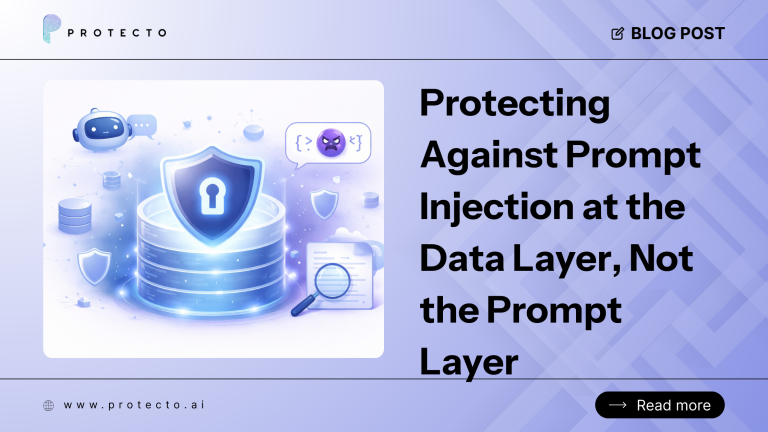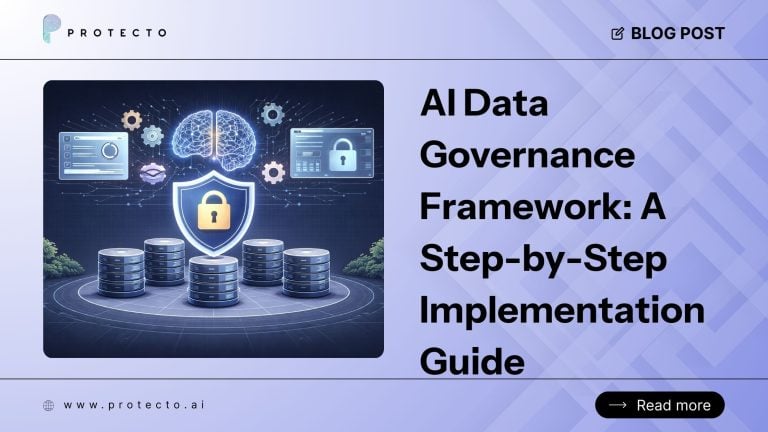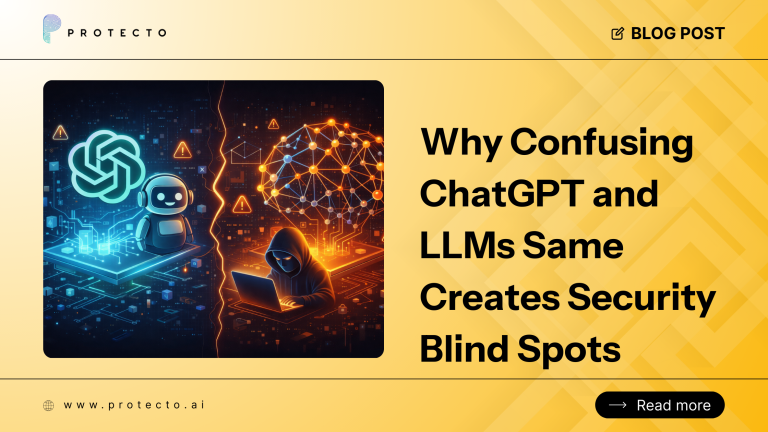What are AI Security Risks?
The OWASP (Open Web Application Security Project), a non-profit AI trust risk and security management and other governments have detected certain security risks that may be associated with the Security Risks of AI. The usage of Generative AI has exploded manifold since its inception. The Gen AI security risks are higher since the usage of Generative AI will lower the bar of entry for being a hacker. They can program AI to perform malicious tasks and orchestrate cybersecurity attacks much more easily.
Protecto provides the state-of-the-art data pseudonymisation tactics. Generative AI security risks increase a lot when you use public LLMs such as ChatGPT or Gemini.

We know that the OWASP performs AI security risk assessments. From that, they’ve identified the 10 most probable security risks of AI. Learn more about those below.
Top 10 AI Security Risks
When it comes to Generative AI security risks, since it is relatively new, there is a lot of time. But, as time has passed, there have been workarounds around most of them. Some of the pressing risks of Generative AI are discussed below.
Inadequate AI Alignment
Since AI has no thoughts or emotions, they do not align with human values. Malicious users can exploit this by asking for ways to build a plastic explosive. Research points out that the most vulnerable languages with little to no supervision are the regional African languages such as Zulu.
Lack of Transparency
It goes without saying that most of us know that the processes of Generative AI are black boxes. However, the companies lack transparency in regard to data leaks or bugs. Lack of transparency also poses an AI security risk since users don’t know what to protect themselves from.
Protecto hosts the data in a privately and securely hosted SaaS server and associates them with tokens to tokenize the data and store these connections in a secure token vault to deal with Gen AI security risks.

Broken Authentication
Another glaring problem with AI Models is there needs to be more authentication for the models to view your data. This in turn makes it so that your data is compromised and you have no data privacy.
Protecto solves this problem by providing granular access to data. Only trusted and vetted people can access the AI Model and its training data.

Bias in AI algorithms
One of the major problems detected by AI trust risk and security management is the tenacity of AI Models to form data biases. These biases are extremely harmful as they may hamper the accuracy and predictions of the model.
Protecto uses synthetic data to populate all use cases to prevent bias in their AI models. Their novel idea to combine synthetic data with real data for training the AI model ensures almost 0 bias.

Misconfiguration in Security Measures
When the AI Models are left to themselves, they may start getting overloaded and start “hallucinating”. These hallucinations make the AI Models fail in detecting cybersecurity risks and making them more susceptible to cyber-attacks such as DoS, DDoS, ransomware and so on.
Improper Error Handling
Most errors and warnings are ignored. At some times, plugins are introduced to silence warnings purposefully. This has the adverse side effect of opening up vulnerabilities in the AI model which will slowly build up to a huge data security risk.
Unauthorised Leakage of Data
By storing data in less secure databases or by Prompt Injections, user’s PII (Personally Identifiable Information) will be inadvertently leaked. This causes huge security breaches and loss of the users’ trust due to these security risks of AI.
Data Privacy
When using Generative AI, due to their proclivity to bug up and release private information about users, they compromise the user’s data privacy. Once their data is fed to the LLM, it is next to impossible to remove this data.
Protecto prevents this by tokenizing all your sensitive data in the cloud before feeding it to LLMs. In this way, the LLMs never get your PII. This retains your data security in cyberspace.

SSRF Vulnerabilities
Since Generative AI models are relatively new, they are not well-versed in tracking and validating every IP address. This makes it susceptible to SSRF (Server-Side Request Forgery) where a malicious user can make requests and send responses to unknown locations.

This is an extremely dangerous combination with IP Spoofing where the attacker disguises their IP Address as their victim’s IP and make requests to the AI Models.
Input Manipulation
In the case of an unauthorised data leak, the defining features used by the model can be found. With this, they can make false inputs which in turn will make the model provide inaccurate outputs.

These are the different risks that the AI Security Risk Assessment agencies have identified as the most prevalent Gen AI security risks.
Different Applications of AI Security Risks
The different security risks of AI can be applied to the different subsets of AI. Here are a few applications.
Generative AI security risks
Generative AI is mostly susceptible to prompt injections and unauthorized data leaks due to its ability to potentially hallucinate and its susceptibility to prompt injections.
Impact of Gen AI on Data Privacy
Gen AI is a technology that can create new data, such as text, images, and audio. The data created by Gen AI is similar to the existing data it has been trained on. These models learn patterns and features from large datasets and then use that knowledge to create new information that exhibits similar characteristics to the original content.
Generative or conversational artificial intelligence (AI) applications like OpenAI’s ChatGPT and Google’s Bard have garnered significant attention and controversy. These tools utilize vast databases to generate human-like responses, leading to discussions on intellectual property, privacy, and security concerns. Despite the impressive progress made by Gen AI, it introduces significant hurdles concerning data privacy and confidentiality.
The implementation of Gen AI gives rise to various privacy issues since it can handle personal data and potentially generate sensitive information. During interactions with AI systems, personal data such as names, addresses, and contact details might be collected explicitly, implicitly or accidentally. The processing of this personal data through Gen AI algorithms can lead to inadvertent exposure or even misuse of personal and sensitive information.
Furthermore, if the training data includes sensitive data such as medical records, financial information, or other identifying details, there is a risk of inadvertently generating sensitive information that violates privacy regulations in different regions, posing a threat to individuals’ privacy and data security.
Interesting read: Implement Role-Based Access for Sensitive Data in LLMs | Protecto
LLM security risks
LLMs are mostly susceptible to Input Data Poisoning if their data center is leaked. Malicious users can add wrong data and also steal your data causing data loss.
ML security risks
There are a lot of risks when it comes to ML models. Models can be stolen easily and be used against you.
Now that we know the different AI Security Risks, how do we properly conduct AI Security Risk Assessments?
Best Practices to Conduct AI Security Risk Assessment
One of the best practices for handling Generative AI Security Risks is to follow the OWASP guidelines and to follow the best AI safety standards. Another part of it is to comply with data privacy and security regulations such as GDPR and in the case of healthcare data HIPAA.
Protecto assures compliance with the data security standards and provides the highest security to AI Models with their services.

How to Mitigate AI Security Risks for Your Business?
There are many ways to Mitigate these AI Security Risks from your business. Some of them can be boiled down to:
- Pseudonymize data before feeding it to the model. Ensure that it is encrypted to the point that it is impossible to perform reconstruction attacks.
- Secure the database with granular access.
- Follow Data Security protocols such as GDPR, HIPAA and so on.
- Ensure that the OWASP security risks are completely covered.
Protecto provides you with these strategies with their revolutionary solution- Intelligent tokenization. This tokenizes the sensitive data present in the dataset. Their privately hosted SaaS server accessible only to them ensures the highest amount of security. They also strictly follow data protection regulations such as GDPR and HIPAA.
Counter Gen AI Security Risks with Data Tokenization
The widespread adoption of Generative Artificial Intelligence has transformed numerous industries, spanning creative arts to content generation to chatbot-based support. However, the growing adoption of this technology is bringing forth significant concerns about data privacy and confidentiality of sensitive information. In this blog, we will examine the impact of Generative AI (Gen AI) on data privacy and will delve into the vital role played by Data Tokenization in addressing potential generative AI security risks.
AI Security Risks & Data Tokenization
By adopting a comprehensive data tokenization strategy and integrating it into the AI data security framework, organizations can maintain data privacy, achieve compliance, and build trust with their customers and stakeholders. However, it’s essential to remember that tokenization should be part of a broader data security strategy that includes other measures such as asset risk assessment, access controls, and ongoing monitoring of data security.
To counter data security threats effectively with Gen AI and LLMs, consider implementing the following strategies with data tokenization:
Data Exposure in Transit:
Tokenization helps protect sensitive data while it is being transmitted between systems. By replacing the original data with tokens, even if intercepted, the data remains meaningless to unauthorized individuals.
Data Exposure at Rest:
Tokenization secures sensitive data stored in databases, data warehouses, or even enterprise applications. Instead of storing actual PII data, only the tokens are retained within the systems, reducing generative AI security risks associated with unauthorized access or data breaches.
Third-Party Access:
When organizations share data with third-party vendors or partners, tokenization ensures that the sensitive data is not exposed. The third party can process the data using tokens while the actual sensitive information remains protected.
Model Data During Training:
Tokenized data used for training AI models prevents inadvertent exposure of sensitive information during the model development process.
Learn More: How Protecto Uses Quantum Computing for True Random Tokenization
Data Exposure:
Gen AI models might memorize sensitive information from the training data, leading to inadvertent data exposure in generated content. Data tokenization ensures that only meaningless tokens are used during training and generation, preventing sensitive data exposure.
Privacy Violations:
If the training data contains personally identifiable information (PII) or confidential data, generated content might inadvertently reveal sensitive details, violating data privacy. Data tokenization helps protect PII and sensitive information, reducing generative AI security risks around privacy violations.
Adversarial Attacks:
Generative AI models can be susceptible to adversarial attacks, leading to the generation of malicious or unintended content. Data tokenization can improve model robustness by limiting access to actual data and reducing the impact of adversarial inputs.
Data Sharing Risks:
Sharing generated content without proper safeguards can inadvertently disclose sensitive information present in the model’s output. Data tokenization ensures that shared content does not reveal original data, mitigating data sharing risks.
Regulatory Compliance:
Data tokenization helps companies to comply with data protection regulations. Since the actual sensitive data is replaced with tokens, companies can stop worrying about privacy risks associated with the sharing of data to Gen AI and LLM models.
Insider Threats:
Data tokenization reduces generative AI security risks of intentional or unintentional insider threats as insiders with access to the AI and LLM models and training data only see meaningless tokens, making it harder for malicious intent.
In summary, by implementing data tokenization in Generative AI applications, organizations can effectively address these AI security risks, protect sensitive information, adhere to regulatory requirements, and build trust with users and stakeholders. It forms an essential part of a comprehensive data security strategy to enable the safe and responsible usage of Generative AI technologies.
Also read: Unlocking AI’s Full Potential | Protecto
Protecto’s Intelligent Data Tokenization
Protecto’s intelligent data tokenization technique delivers the highest data privacy and security while ensuring usability of your tokenized data. It surgically masks the personal and sensitive data while leaving the rest of the data as-is and perfectly readable. Be it generative AI usage or simply sharing enterprise data, safeguarding privacy and security of your enterprise data is of utmost importance to us.
Our tokenization approach masks PII and sensitive data consistently across all data sources. The mapping of the token with the PII/sensitive information is stored in a highly encrypted Vault. With our intelligent data tokenization solution, we help companies maximize the power of their enterprise data by letting them safely share it with their stakeholders while safeguarding data privacy.
Schedule a demo to learn how you can leverage Protecto to transform how you can leverage your enterprise data along with Generative AI and LLM models.
Frequently asked questions on Generative AI Security Risks & Data Tokenization
What are Generative AI security risks?
Generative AI (Gen AI) security risks refer to potential threats associated with the use of generative models, such as GANs (Generative Adversarial Networks) and language models like GPT, that can create synthetic data. These risks include data leakage and privacy violations.
How does Generative AI pose risks to data privacy?
Generative AI can generate realistic synthetic data, which may inadvertently include sensitive information from the original data used to train the model. If not properly controlled, this can lead to data privacy breaches and unauthorized disclosure of confidential information.
What role does data tokenization play in mitigating Generative AI security risks?
Data tokenization can be used to protect sensitive data used in the training of generative AI models. By replacing real data with tokens, the risk of exposing original data during model training or inference is significantly reduced, enhancing data privacy and security.
Can Generative AI models be vulnerable to adversarial attacks?
Yes, generative AI models are susceptible to adversarial attacks, where maliciously crafted inputs can cause the model to generate misleading or incorrect outputs. These attacks can be mitigated by using techniques such as adversarial training and data tokenization.
How does data tokenization help in ensuring safe model deployment?
Data tokenization helps in safe model deployment by ensuring that the generative AI model does not directly handle sensitive data. Instead, it operates on tokens, making it more challenging for attackers to extract original sensitive information.
What are the benefits of using data tokenization to protect against Generative AI security risks?
Data tokenization offers several benefits for generative AI data security, including protecting sensitive data, reducing the risk of data exposure, achieving regulatory compliance, and enhancing user trust in AI-generated content.
Is data tokenization effective against insider threats related to Generative AI data?
Yes, data tokenization can help mitigate insider threats related to generative AI data. Insiders will only have access to tokens, not the original data, reducing the risk of misuse or unauthorized disclosure.
Can Generative AI Models be used for malicious purposes, and how can data tokenization help prevent this?
Generative AI models could be exploited for generating malicious content, such as fake images or misleading text. Data tokenization can help prevent this by ensuring that the models never operate on real data directly, thus reducing the potential for generating harmful content.




